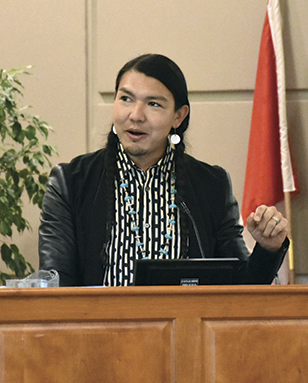Page Content
James Makokis, recent winner of the Amazing Race Canada, poses for a photo with teachers following a talk hosted by the Edmonton Catholic Teachers Local No. 54. Pictured with Makokis are (L-R) Patti Liogier, Colleen Skeels and Sara Borchiellini.
Show up for your students and you can save their lives.
That was the message brought forth by James Makokis, a Cree physician who works with two-spirit and transgender patients, as he spoke with Edmonton Catholic teachers at a professional development event on Oct. 28.
Makokis, who identifies as two-spirit and uses male pronouns, is also a recent winner of the Amazing Race Canada along with his husband Anthony Johnson. Makokis spoke with teachers about the importance of openness as it relates to Indigenous education and working with LGBTQ2S+ youth.
“Indigenous society is a fully intact puzzle, evolving over thousands of years,” Makokis said, referring to precolonized societies. “Then colonization happened, and the puzzle was thrown up into the air. Now there are pieces scattered everywhere.”
He urged teachers to think of this puzzle when they see Indigenous students struggling at school.
“You see kids who don’t come to school, kids who aren’t engaged in learning, kids with low self-esteem, kids with addiction issues and a home environment that might be in chaos. We are constantly working within our own nations to put that puzzle back together.”
How can teachers help? By bringing regional teachings into the classroom, helping to uncover stories about the land, and modeling critical thinking, especially in terms of sources that present a colonized view of Canadian history.
“We have many good allies like you who are uncovering the history of this country and teaching it in a way that is actually representative of what has happened here, to make better lives for your students,” Makokis said. 
Makokis presented examples of field trips he’s been involved in, such as taking students to Jasper to learn about the history of the land and the importance of specific locations.
“[Indigenous education] gives students the self-esteem, the resilience, all of those things that are going to encourage them to be successful in school,” he said.
Puberty presents challenges
In terms of working with gender diverse students, Makokis said that trans youth especially may have a hard time when puberty hits.
“People can be completely different because their bodies are changing in a way that doesn’t reflect how they feel inside, and they really need teachers who are open and caring.”
|
I know it can be uncomfortable to have those conversations, but start having them, because you can save lives.
|
He suggested that teachers identify themselves as allies and talk to the student directly.
“I know it can be uncomfortable to have those conversations, but start having them, because you can save lives,” he said.
Makokis showed images from the filming of the Amazing Race in which he and his husband wore rainbow skirts.
“We wanted to show young people that if no one else in [their] life supports them, that we do,” he said.
He added that he can see that society’s attitudes towards gender and sexuality are changing, and he can tell that the young patients that he sees have a more supportive school environment.
“They come see me about their hormones and they’re scared, but they see all these things that you’re doing for them, and they see the teachers who are putting themselves out there,” he said. “You’re awesome ambassadors at creating safe and inclusive schools.” ❚
